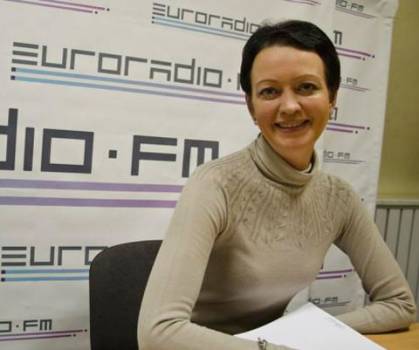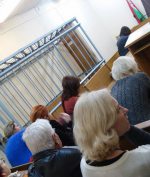Continuation of the trial on Elena Tankacheva's appeal against expulsion from Belarus
January 9, the Pershamaiski District Court of Minsk continues considering the appeal of the human rights activist Elena Tonkacheva against the decision of the Pershamaiski District Department of Citizenship and Migration to expel her from Belarus and ban her entrance to the country for three years. The appeal is considered by Judge Natallia Petukh.
January 8, the court heard the opinions about the essence of Elena Tonkacheva's case, expressed by representatives of the Department of Citizenship and Migration and witnesses from Tonkacheva's side – Enira Branitskaya, Volha Smalianka, Iryna Sukhiy, Siarhei Drazdouski, Andrei Yahorau and her mother Halina Tonkacheva.
10.55 a.m. - Elena Tonkacheva's colleagues enter, civil society activists and journalists keep coming to the court hall.
11.10. The hearing begins. About 20 people are present in the hall, including the representative of the Department of Citizenship and Migration Kryshtaliou and the witness summoned by him, a specialist in road safety Haurosh.
11.15. The DCM representative is giving muddled and unclear objections to Tonkacheva's complaint. The judge asks him to speak in a plain and clear language.
11.30. The DCM representative explains that the decision to expel Tonkacheva was considered by the deputy head of department Baranau, who decided to change the time of the decision, which was factually taken by the head of the department.
Tonkacheva asks: from which document does an expulsion begin?
Kryshtaliou starts picking at Tonkacheva's words. He says she was handed two notices. In the first one it is stated that the reason for the expulsion was the she had been brought to administrative responsibility, and the second contains the exhaustive enumeration of the exact reasons.
11.40. The lawyer asks a specific questions: under which Article of the Code of Administrative Offenses Tonkacheva was punished? He also asks the representative of the defendant to name the article in the law on the legal status which could substantiate the expulsion of a person from Belarus for an offense against traffic safety. He also asks where the notion of “public order” was taken from. Kryshtaliou cannot answer and says he can write it later. The lawyer again asks from which document the definition of the public order was taken.
The judge asks Tonkacheva whether the later can live a law-abiding life. "Yes, I can," responds the human rights activist.
Witness Viachaslau Haurosh, head of the traffic police of the Pershamaiski District Police Department, starts speaking. He explains that Tonkacheva has applied to the traffic police for redrawing of the violation reports. The judge asks him to present all documents concerning Tonkacheva, which initially concerned her and then were redrawn as violations of traffic rules by other persons. As a result, it becomes clear that she there were no registered violations of traffic rules by Tonkacheva's vehicle in the Pershamaiski district of Minsk.
The judge asks the witness whether there are many people who commit four or more offences a year and whether the penalty envisaged by part 1 of Article 18.13 of the Code of Administrative Offenses of Belarus has been increased. The witness explains that the penalty on this part of the article hasn't been increased, and in the cases traffic rules are violated by foreign citizens more than 2 times a year, DCM holds talks with them. The information about the identity of the offender is not verified, it is enough for the owner of the car to plead guilty of the offense or get the violation report redrawn.
12.05. The judge asks the witness why legislators provided the option of changing the responsibility from the owner of the car on other persons. The witness doesn't know why, but says that there were cases in which the offenders removed the administrative violations from themselves after learning about the responsibility.
12.10. The lawyer reads out the rationale why Article 65, with violation of which Tonkacheva is charged, can not be used as a ground for expulsion, as she didn't commit any offenses associated with this article.
12.27. Elena Tonkacheva presents to the court the general power of attorney for the right to use the apartment and other property, issued to her by her mother. The document is attached to the case. She also makes two motions:
1) to draw the attention of the court to the inadmissibility of discriminatory statements by state officials, namely Rudyshkina, who said “I cannot understand how a woman can allow law violations” at yesterday's hearing.
2) to make a private remark to the Pershamaiski District Police Department for systemic violations of the rights and legal insterests of citizens by non-issuance of the rulings on expulsion and the failure to familiarize with the rulings those whom they concern. The court didn't promise to take any measures concerning these motions.
12:34 The representative stated the need for additional time to more carefully study and prepare
his justifications and objections. In addition, Rudyshkina specified that the opportunity to get acquainted had been presented to her, but no copies of documents had been issued.
The judge says that the date for familiarization with the document will be appointed later and also obliges the representatives to present the instruction on office work for the district police department or the department of citizenship and migration (if there is any), which regulates the issuance/non-issuance of the rulings on expulsion to the interested persons. If there is no such instruction this should be confirmed by presenting a confirming note.
12:45 In addition, the court was not provided with copies of applications of citizens, civil society organizations and public figures. Representatives of of the department promised to present these documents at today's hearing.
12:50. Tonkacheva in her speech draws the attention of the court to the fact that her relationship with the country was not well studied, understood and taken into account by the state body which issued the ruling. She asks the court to take into account the large number of appeals and the characterizations which have been given to her by citizens and members of civil society organizations.
1.06 p.m. At the end, the lawyer again draws the attention of the court and the present people to the fact that the issue of expulsion is in no way connected with the cancellation of the residence permit and the administrative offenses that have been repaid:
"We can not talk about public danger, because neither the Code of Administrative Offenses, nor the Civil Code contain such a notion. As soon as a social deed acquires the features of social danger, it becomes a criminal offense. And Elena Tonkacheva hasn't committed such offenses,” sums up the lawyer.
1:13 The hearing ends. The next hearing is appointed at 2.30 p.m. on January 12.




















